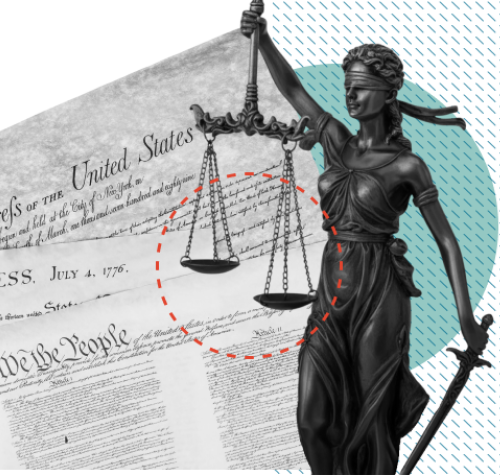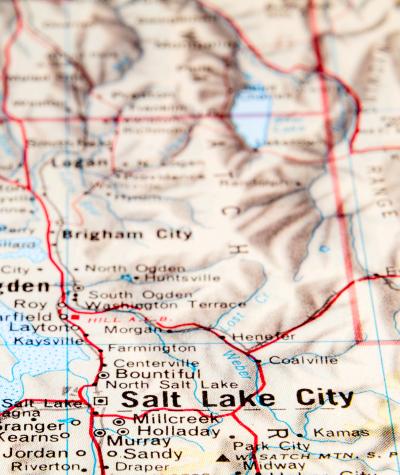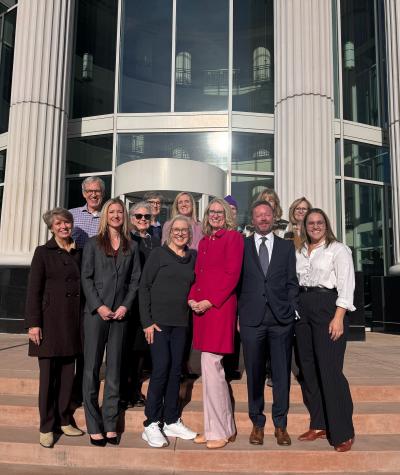New: Maurene Comey’s Dismissal Threatens First Amendment Rights for all Civil Servants, CLC Argues in Brief
Washington, D.C. — Today, Campaign Legal Center (CLC), on behalf of Michael Feinberg and Justice Connection, filed a brief in the U.S. District Court for the Southern District of New York in a case brought by former federal prosecutor Maurene Comey claiming President Donald Trump ordered her dismissal because James Comey, former FBI director, is her father.
Ordering the removal of Comey because of her perceived political beliefs and familial connections, as CLC argues in our brief, is a clear act of unlawful retribution that violates her First Amendment rights and threatens the rights of more than two million civil servants working in the government. Civil servants must be free to hold and express political opinions without fear of reprisal, and political alliance with the president cannot be a requirement for public service.
"President Trump’s relentless attempts to politicize the federal workforce have reached new heights with yet another high-profile dismissal meant to instill fear and compliance across the federal workforce," said Danielle Lang, vice president for voting rights and rule of law at Campaign Legal Center. "Firing an accomplished civil servant for the crime of being related to a political adversary is a gross violation of the First Amendment. It is crucial that the court steps in with expediency and calls this firing what it is — unlawful political retribution."
Comey seeks to have her case heard by a federal court rather than the Merit Systems Protection Board (MSPB), arguing that the MSPB is no longer independent from the president, as it was designed to be, and cannot give her a fair trial. As CLC argues, the federal courts have a duty and responsibility to protect civil servants from gross abuses of executive power.
"No civil servant should be fired because of who they associate with — whether it be their father or a friend," said Stacey Young, executive director and founder of Justice Connection. "Congress recognized nearly 150 years ago that government tasks were too important to be performed by loyalists. The law states that hiring, promotions and terminations should be based on merit — not sycophancy to political leadership."
"Apolitical public servants are a necessary precondition for the rule of law in our nation, and this is particularly true in those agencies which have the power to investigate the citizenry and, at times, charge and convict them of crimes," said Michael Feinberg, former FBI Assistant Special Agent in Charge. "I am hopeful that our judicial system will recognize this in Ms. Comey’s case, and begin to restore a sense of normalcy to our civil service procedures."
The administration is attempting to deprive Comey of her day in court and argue that her case must be adjudicated by the compromised MSPB. The District Court should swiftly rule on this case and uphold First Amendment protections for civil servants as a fundamental principle of nonpartisan, representative government.
Follow the latest updates on this amicus brief via Campaign Legal Center’s case page.
Learn more about presidential overreach and the politicization of the federal workforce here.
###
The nonpartisan Campaign Legal Center advances democracy through law. We safeguard the freedom to vote, defend voters’ right to know who is spending money to influence elections, and work to ensure public trust in our elected officials.
Learn more about CLC. Don't miss out on our latest resources: Subscribe to President Trevor Potter's newsletter on LinkedIn or email, tune in to the latest season of our award-winning podcast, Democracy Decoded, and join our livestreamed events.
CLC Urges Return to Bipartisanship to Ban Congressional Stock Trading
Today, Republican members of the U.S. House of Representatives announced new legislation that dramatically weakens a bipartisan, consensus proposal to prohibit members of Congress and their families from trading individual stocks. While this new legislation would stop lawmakers from buying additional stocks, it would fall short by allowing them to keep or sell the assets they already own — and retain the profits. It also would not prevent members of Congress from voting or acting in ways that benefit their existing holdings.
Last month, House Democrats also jeopardized the bipartisan compromise on stock trading by introducing a separate proposal that does not have enough support to become law. That bill would have included the president and vice president in the stock trading ban.
Kedric Payne, vice president, general counsel and senior director for ethics at the nonpartisan Campaign Legal Center, issued the following statement:
“Any legislation that allows lawmakers to hold onto their existing stocks is too narrow to address Americans’ real concern that elected lawmakers may make official decisions to benefit their pocketbooks instead of the public good. A bill that also bans trading by the president and vice president, meanwhile, is too broad because it undermines the chances of passing the reform voters care most about: stock trading by members of Congress.
“Thankfully, there is a proposal on the table that strikes the balance for this moment: the Restore Trust in Congress Act. This consensus legislation was crafted during months of negotiations by lawmakers on both sides of the aisle. It has more than enough support to pass, and it would make a significant improvement to our nation’s government ethics laws. Campaign Legal Center calls on Congress to return its focus to this bipartisan bill and set an example for the other branches of our government.”
###
The nonpartisan Campaign Legal Center advances democracy through law. We safeguard the freedom to vote, defend voters’ right to know who is spending money to influence elections, and work to ensure public trust in our elected officials.
Learn more about CLC. Don't miss out on our latest resources: Subscribe to President Trevor Potter's newsletter on LinkedIn or email, tune in to the latest season of our award-winning podcast, Democracy Decoded, and join our livestreamed events.
Campaign Legal Center and Protect Democracy Urge the U.S. Supreme Court to Uphold Mail-In Ballot Laws
Washington, DC — Today, Campaign Legal Center (CLC) and Protect Democracy filed an amicus brief urging the U.S. Supreme Court in the Watson v. Republican National Committee case to uphold each state’s constitutional ability to set rules for receiving and counting mail-in ballots.
The Supreme Court is set to hear arguments in Watson v. Republican National Committee, a case challenging a Mississippi law that allows mail-in ballots postmarked by Election Day to be counted if they are received within five business days after an election. This challenge is a direct contradiction to the power that states have to set laws governing ballot receipt deadlines.
In 2022, led by Sens. Joe Manchin and Susan Collins, Congress passed the Electoral Count Reform Act (ECRA), which made substantial updates to post-Election Day processes originally established under the 1887 Electoral Count Act. Notably, Congress intentionally designed the ECRA not to disturb vote-by-mail and absentee ballot receipt deadlines set by states.
“Many states across the political spectrum give voters secure ways to exercise their freedom to vote by mail,” said Adav Noti, executive director at Campaign Legal Center. “The Supreme Court must uphold states’ authority to enact these long-standing laws that protect voters from being disenfranchised by mail delays outside their control.”
“The Constitution grants states both the authority and duty to administer elections, as the Founders believed states are best positioned to exercise this critical democratic role,” said Jane Bentrott, counsel at Protect Democracy. “Mississippi’s law is consistent with the Constitution, and it allows voters whose ballots are postmarked by Election Day to participate in our democracy.”
Follow the latest updates on this amicus brief via Campaign Legal Center’s case page.
###
The nonpartisan Campaign Legal Center advances democracy through law. We safeguard the freedom to vote, defend voters’ right to know who is spending money to influence elections, and work to ensure public trust in our elected officials.
Learn more about CLC. Don't miss out on our latest resources: Subscribe to President Trevor Potter's newsletter on LinkedIn or email, tune in to the latest season of our award-winning podcast, Democracy Decoded, and join our livestreamed events.



